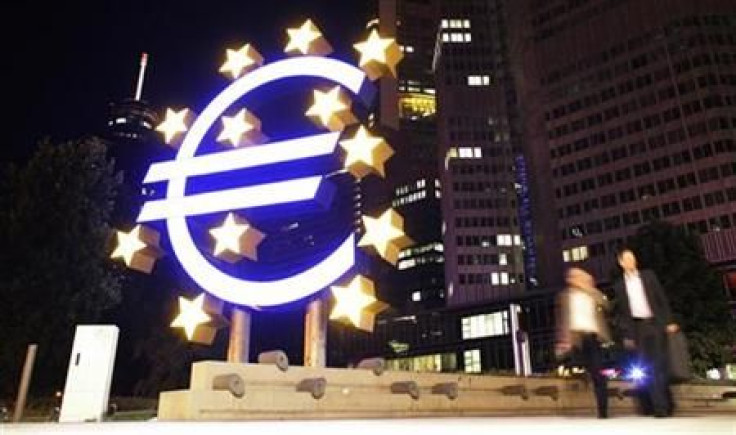Euro zone escalation fears ease after Spain auction

Spain and Italy staged successful bond sales on Thursday, easing concerns about an escalation of euro zone debt strife and buying the bloc's leaders more time to come up with a new package of anti-crisis measures.
European Central Bank President Jean-Claude Trichet renewed a call for euro zone governments to boost the size and scope of their 440 billion euro ($578.2 billion) rescue fund and warned of short-term inflation pressures in the euro area.
The euro pushed up to its highest level against the dollar in a week and the risk premium investors demand to hold debt from the euro zone's fragile southern periphery fell, in a sign investors are more confident about the bloc's determination to address its economic woes.
After a rocky start to the year, optimism was rekindled on Wednesday when Portugal attracted strong demand for its 10-year bonds and German Finance Minister Wolfgang Schaeuble promised a comprehensive new package of debt crisis measures by the time EU leaders meet for a summit in March.
Today, Spain and Italy passed their first major financial tests of 2011, auctioning a total of 9 billion euros in bonds.
Following rescues of Greece and Ireland last year, Portugal and Spain are seen as the euro zone countries most at risk of a bailout and weak demand for their bonds would have aggravated jitters and raised pressure on European leaders to act fast.
The figures look really good, it's the perfect sequel to the Portugal auction yesterday, Michael Leister, a strategist at WestLB in Duesseldorf, said of the Spanish auction.
EFSF PRESSURES
Top EU officials, including European Commission President Jose Manuel Barroso, are pushing for the bloc to increase the size of the rescue fund it rushed into place following its bailout of Greece in May.
Trichet told a news conference, following the ECB's decision to keep its interest rates at a record low 1 percent, that the fund needed to be improved quantitatively and qualitatively.
But both Germany and France say they see no need to boost the so-called European Financial Stability Facility (EFSF).
If you start that discussion at a time when not even 10 percent of the fund has been used ... then you wake the concern that one should expect it will be used, Schaeuble told the Foreign Press Association in Berlin.
The euro zone's big countries are discussing closer fiscal coordination and other steps meant to soothe market fears about economic and financial imbalances in the euro area.
One idea that is being floated is to reduce the interest rate demanded of countries that tap the facility. Another is to allow the EFSF, or the facility that will replace it in 2013, to buy government bonds or provide short-term credits to vulnerable euro members -- ideas that are controversial in Berlin.
This week's auctions appear to have bought leaders some time to finalize their plan, but pressure from nervous markets could resurface quickly if they sense governments are wavering on introducing bold new steps.
ROBUST DEMAND
Spain sold 3 billion euros of 5-year bonds on Thursday at a yield of 4.54 percent -- nearly a full percentage point more than at a previous auction in November but well below the level some had feared.
Demand was robust with over 6 billion euros in bids and 60 percent of the debt was bought by investors outside of Spain, a source told Reuters.
Shares in large Spanish banks, whose own debt levels and exposure to a collapsed property market have worried markets, shot higher for a second day, with Banco Santander trading up 4.0 percent and BBVA rising 5.3 percent.
But in a reminder that Spain's financial sector remains vulnerable, retail bank Banesto announced its profit had tumbled nearly 20 percent last year due to bad loans and a price war for deposits.
Like Spain, Italy saw yields rise as it sold 6 billion euros in 5- and 15-year bonds, but demand was stronger than its last sale in November. Italy has largely avoided the wrath of the bond markets, but could become a target due to its high debt levels.
In a sign of the toll the crisis is taking on European leaders, Irish Prime Minister Brian Cowen came under new pressure from members of his own party.
Cowen has seen his popularity ratings sink into the single digits after overseeing a meltdown in the banking sector, and he has promised to call an election in the coming months, but speculation grew on Thursday that he could be forced out sooner.
A number of ministers have spoken to him and asked him to look at the options, a lawmaker from Cowen's Fianna Fail told Reuters, requesting anonymity.
(Additional reporting by Padraic Halpin in Dublin; Annika Breidthard and Sarah Marsh in Berlin; Writing by Noah Barkin; Editing by Mike Peacock)
© Copyright Thomson Reuters 2024. All rights reserved.











